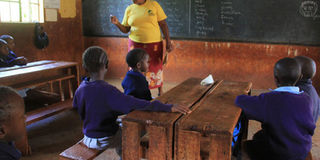Knut, Kuppet oppose Ministry directive on local languages

A class in progress at Kiamuiru primary school in Nyeri on January 23, 2014. PHOTO | JOSEPH KANYI
What you need to know:
- The Kenya National Union of Teachers asked the ministry to suspend the policy and talk to teachers before implementing it
- The Sessional Paper states: “The language of the catchment area (Mother Tongue) shall be used for child care, pre-primary education and in the education of Lower Primary children (0-8 years).”
Teachers have opposed a new directive by the Ministry of Education requiring them to teach pupils from class four and below in local languages, saying the policy was not only difficult to implement but also retrogressive.
They also said they were in the dark as far as the policy is concerned as they were not consulted when it was being formulated.
The Kenya National Union of Teachers asked the ministry to suspend the policy and talk to teachers before implementing it, while the Kenya Union of Post-Primary Education Teachers said the new policy contained in the Sessional Paper 14 of 2012 was not presently applicable considering the technological advancements and the push for peaceful inter-tribal co-existence.
Knut Secretary-General Wilson Sossion said the union was not consulted and therefore found it out of place.
“You do not issue a policy without first consulting key players. We are urging the ministry to take it back to allow consultation otherwise it would be difficult to implement. This is a matter that requires all players to agree,” he said.
Kuppet chairman Omboko Milemba said: “It is a retrogressive policy. We are asking the ministry to abandon it. We think it was prepared by the old men and women at the ministry who are eager to push for directives not in tandem with current happenings.”
“Let the ministry put it aside and consult widely with everyone involved in the education. We were never consulted on this. We are surprised that such a policy could be thought of and all teachers will be required to observe yet unions were not consulted,” said Mr Milemba on the phone.
Mr Sossion suggested that the local languages could be promoted in schools if they are taught but not used as a mode for instructing pupils.
“If you would like to promote local languages then they should be taught as subjects and the two national languages remain for instruction,” Mr Sossion said.
The Sessional Paper of 2012 made public on Monday states: “The language of the catchment area (Mother Tongue) shall be used for child care, pre-primary education and in the education of Lower Primary children (0-8 years).” (READ: Local languages to be used in schools)
The unions also said it would be difficult to observe the directive considering that most teachers were never taught how to teach in their languages.
“Where will we get the teachers to teach in mother tongue? There is no training for teachers to conduct instructions in local languages,” said Mr Milemba.
Mr Sossion said it was important to do a “situation analysis” to know how to go about the Sessional Paper and avoid running into trouble.
“If a teacher from upcountry is sent to Tana River County, for instance, how will you expect to teach in a local language he or she does not understand?” asked Mr Sossion.





